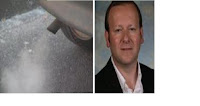 'Mark Bradshaw, executive councillor for transport at Bristol City Council, said: "The DfT report is a welcome endorsement of our determined focus on managing traffic congestion.' (report here)
'Mark Bradshaw, executive councillor for transport at Bristol City Council, said: "The DfT report is a welcome endorsement of our determined focus on managing traffic congestion.' (report here)If we are to get anywhere near the carbon emissions cuts science says is necessary* to avoid the worst climate change then cities like Bristol need to go far beyond 'managing traffic congestion'. Part of the reason we have the climate problem in the first place is because this is all we have done over several decades. And lets not forget all the other problems and costs caused by traffic!
Where are the transport plans which are capable of achieving absolute traffic reduction as opposed to a reduction in the growth rate of traffic and an improvement in traffic flow??
___________________________________________
*Note: Bristol City Council has a carbon emissions reduction target of 60% from yr 2000 levels by 2050. The Government's Climate Change Bill, which became law on 26 November this year, includes a much tougher target 'Green house gas emission reductions through action in the UK and abroad of at least 80% by 2050, and reductions in CO2 emissions of at least 26% by 2020, against a 1990 baseline.' There is solid evidence that these targets and timescales, which are challenging in themselves, are insufficient (see refs in this article).
"carbon emissions reduction target of 60% from yr 2000 levels by 2050"
ReplyDeleteGreat. That means they don't have to do anything till ... ooh ... 2049!
Way to go.
I think the council has a target of reducing its own emissions ie from its buildings etc by 3% per year. However, the council's own emissions are only 2.5% of Bristol's total.
ReplyDeleteTracing this back to the DfT release and the targets and methodology behind it, there's only one concusion - nothing has changed much, and for what little change there has been, we don't know for sure in what direction.
ReplyDeleteThe data gathering is far too uncertain.
Even if it was known to be accurate, you could pick your own explanation for the results, and that's exactly what Mark Bradshaw is doing. I dare say that in Manchester they're putting some glossy spin on the reported 8% reduction in 'person miles' at peak hours.
As you say, it all misses the real issue anyway. Not only is the congestion still intolerable, there is no real attempt to make the drastic cuts we need to reduce our carbon footprint (and, by the by, to make city travel much quicker)